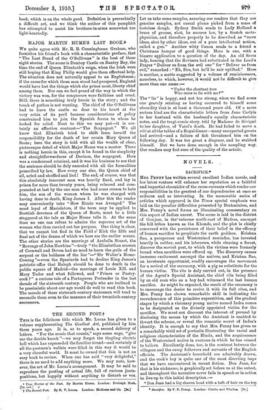MAJOR MARTIN HUME'S LAST BOOK.I• WE quite agree with Mr.
R. B. Cunninghame Graham, who furnishes his friend's book with a characteristic preface, that "The Last Stand of the O'Sullivans " is the best of these eight stories. The scene is Dunboy Castle on Bantry Bay, the time the end of Queen Elizabeth's reign, when the Irish were still hoping that King Philip would give them effectual help. The situation does not naturally appeal to an Englishman ; if the cause for which these men stood had prospered, England would have lost the things which she prizes most, liberty chief among them. Nor can we feel proud of the way in which the victory was won, for the conquerors were faithless and cruel. Still, there is something truly heroic in the story ; and the touch of pathos is not wanting. The chief of the O'Sullivans had to leave the castle so dear to his heart at the very crisis of its peril because considerations of policy constrained him to join the Spanish forces to whom he looked for relief. Next to this we may put—it is cer- tainly an effective contrast," The Scapegoat." We all know that Elizabeth tried to shift from herself the responsibility for the death of her cousin Mary Queen of Scots ; here the story is told with all the wealth of clear, picturesque detail of which Major Hume was a master. There is nothing heroic in this, except it be found in the simplicity and straightforwardness of Davison, the scapegoat. Here was a condemned criminal, and it was his business to see that the sentence should be duly executed with all the formalities prescribed by law. How every one else, the Queen chief of all, acted and shuffled and lied ! The end, of course, was that this absolutely innocent man was heavily fined, and lay in prison for more than twenty years, being released and com- pensated at last by the one man who had some reason to hate him, the son of the woman whom he was charged with having done to death, King James I. After this the reader may conveniently take "How Rizzio was Avenged." The most loyal of Mariolaters, if the term may be applied to Scottish devotees of the Queen of Scots, • must be a little staggered at the tale as Major Hume tells it. At the same time no one can refuse to admire the supreme art of the woman who thus carried out her purpose. One thing is clear, that we cannot but find in the Field o' Kirk the fifth and final act of the drama of which we here see the earlier scenes. The other stories are the marriage of Arabella Stuart, the "Revenge of John Hawkins "—truly "the Elizabethan seamen of Cornwall and Devon had no need to learn the guile of the serpent or the boldness of the liar "—" Sir Walter's Home- Coming "—even the Spaniards had to decline King James's patriotic offer that Ralegh should be done to death in the public square of Madrid—the marriage of Louis XII. and Mary Tudor and what followed, and "Prince or Pastry- cook ?" a curious tale of a Portuguese Pretender in the last decade of the sixteenth century. People who are inclined to be pessimistic about our age would do well to read this book. The morals of these sixteenth-century statesmen will tend to reconcile them even to the manners of their twentieth-century successors.










































































 Previous page
Previous page